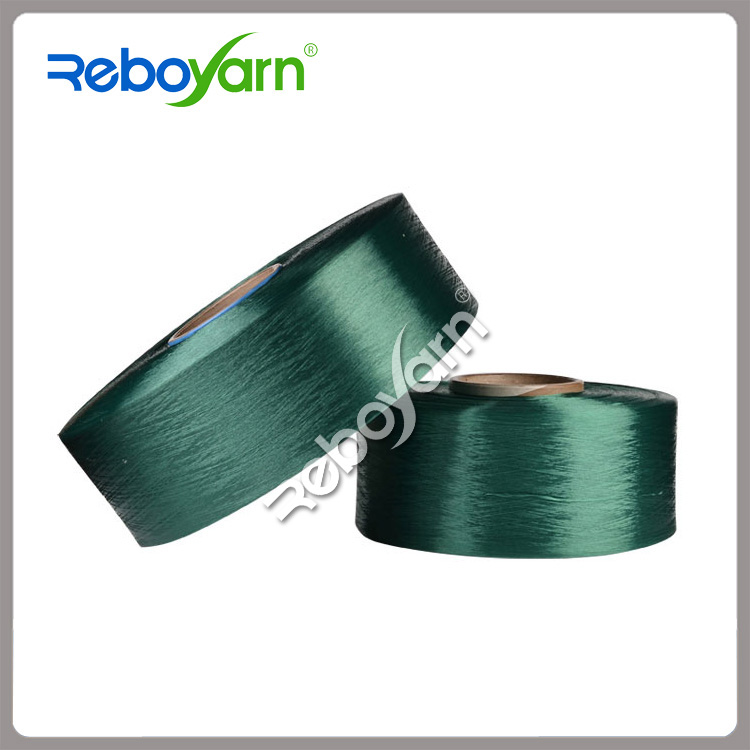Embracing Sustainability: The Rise of Recycled Polyester Yarn
2024-08-09
In a world increasingly focused on sustainability, the fashion and textile industries are making significant strides towards greener practices. One of the most impactful innovations in this realm is recycled polyester yarn. This eco-friendly material is transforming how we think about textiles and contributing to a more sustainable future. In this blog, we’ll explore what recycled polyester yarn is, its benefits, and how it’s making waves in the fashion and textile industries.
What is Recycled Polyester Yarn?
Recycled polyester yarn is a type of yarn made from recycled plastic bottles, fabrics, or other polyester waste. Unlike traditional polyester, which is derived from petrochemicals, recycled polyester is created by reprocessing used plastic materials. The process involves cleaning and shredding the plastic waste, melting it down, and then spinning it into new yarn. This yarn can then be used to create a wide range of textile products.
The Process of Making Recycled Polyester Yarn
1. Collection and Sorting:
- The first step involves collecting used plastic bottles or polyester fabrics. These materials are then sorted to remove any non-recyclable items and contaminants.
2. Cleaning and Shredding:
- The sorted plastics are thoroughly cleaned to remove labels, residues, and other impurities. After cleaning, the plastic is shredded into small pieces called flakes.
3. Melting and Extruding:
- The plastic flakes are melted down and extruded into long fibers or pellets. These fibers or pellets are then cooled and solidified.
4. Spinning:
- The solidified fibers are spun into yarn using traditional spinning techniques. The result is recycled polyester yarn that can be used just like conventional polyester yarn.
5. Textile Production:
- The recycled polyester yarn can be woven or knitted into fabrics for various applications, from clothing and accessories to home textiles and industrial products.
Benefits of Recycled Polyester Yarn
1. Environmental Impact:
- Reduces Waste: By repurposing plastic waste, recycled polyester yarn helps divert materials from landfills and reduces pollution.
- Conserves Resources: The production of recycled polyester uses less energy and water compared to manufacturing virgin polyester, helping to conserve natural resources.
2. Lower Carbon Footprint:
- Reduced Emissions: The process of recycling plastic generally results in lower greenhouse gas emissions compared to producing polyester from raw petrochemicals.
3. Maintains Quality:
- Comparable to Virgin Polyester: Recycled polyester yarn maintains similar performance and durability characteristics as virgin polyester, ensuring that recycled products meet high-quality standards.
4. Encourages Circular Economy:
- Supports Sustainable Practices: By creating a closed-loop system where materials are continually recycled and reused, recycled polyester yarn promotes a circular economy model.
5. Versatility:
- Wide Range of Applications: Recycled polyester yarn can be used in various textile products, including clothing, sportswear, home furnishings, and industrial applications.
Applications of Recycled Polyester Yarn
1. Fashion Industry:
- Sustainable Clothing: Designers and brands are increasingly incorporating recycled polyester yarn into their collections, creating eco-friendly fashion that appeals to environmentally conscious consumers.
- Activewear and Sportswear: Recycled polyester is popular in activewear due to its moisture-wicking and durable properties.
2. Home Textiles:
- Rugs and Carpets: Recycled polyester yarn is used in making durable and stain-resistant rugs and carpets.
- Bedding and Upholstery: Recycled polyester fabrics are also used for bedding and upholstery, offering a sustainable option for home decor.
3. Industrial Uses:
- Technical Fabrics: Recycled polyester is used in technical fabrics for applications such as automotive interiors and outdoor gear.
4. Accessories:
- Bags and Accessories: Recycled polyester yarn is used to create various accessories, including bags, backpacks, and belts.
Challenges and Considerations
While recycled polyester yarn offers numerous benefits, there are some challenges to consider:
1. Quality Control:
- Consistency: Ensuring consistent quality and performance of recycled polyester yarn can be challenging due to variations in the source material.
2. Processing Limitations:
- Color and Texture: Recycled polyester yarn may have limitations in color and texture compared to virgin polyester, depending on the quality of the recycled material.
3. Consumer Perception:
- Education and Awareness: Educating consumers about the benefits of recycled polyester and overcoming misconceptions about its quality are essential for widespread adoption.
Future Trends in Recycled Polyester Yarn
1. Technological Advancements:
- Improved Recycling Techniques: Advances in recycling technology are expected to enhance the efficiency and quality of recycled polyester yarn production.
2. Increased Use of Post-Consumer Waste:
- Greater Focus on Recycling: The industry is likely to see an increase in the use of post-consumer plastic waste, further reducing reliance on virgin materials.
3. Collaborative Efforts:
- Industry Partnerships: Collaboration between brands, manufacturers, and recycling organizations will play a crucial role in expanding the use of recycled polyester and improving recycling infrastructure.
Conclusion
Recycled polyester yarn represents a significant step towards a more sustainable and circular textile industry. By repurposing plastic waste and reducing the environmental impact of textile production, recycled polyester yarn is helping to pave the way for a greener future. Its versatility, quality, and environmental benefits make it an attractive choice for a wide range of applications, from fashion to industrial uses.
As the world continues to focus on sustainability and resource conservation, recycled polyester yarn will play an increasingly important role in shaping the future of textiles. Embracing this innovative material not only supports eco-friendly practices but also contributes to a more sustainable and responsible industry.



